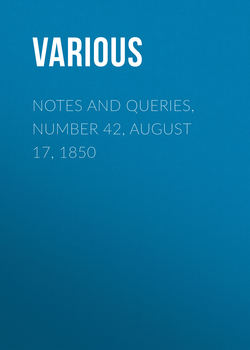Notes and Queries, Number 42, August 17, 1850

Реклама. ООО «ЛитРес», ИНН: 7719571260.
Отрывок из книги
The two exceedingly valuable elucidations which the geography of King Alfred relating to Germany (intercalated in the royal author's translation of Orosius), has received from your learned contributors MR. R.T. HAMPSON (Vol. i., p. 257.) and MR. S.W. SINGER (Vol. i., p. 313.) induce me to offer some new views on the same subject. From my having passed a long series of years in the countries described, and read and examined all that continental authors, as well as Englishmen, have written or conjectured on the subject, I trust that my opinions, though differing from all hitherto received, may not be unworthy the attention of these gentlemen, and of your other numerous subscribers. I shall, however, at present, not to exceed the necessary limitation of your articles, restrict myself to a consideration of the very disputed Cwenas and the Cwen-sae, which both the gentlemen have not alluded to.
The universal agreement amongst the commentators (with the two solitary exceptions I shall hereafter mention), by which this sea is taken for the White Sea, is diverting, and has been the primary source of many of their errors, and of that most monster one, by which Othere's narrative has been made the relation of a voyage round the North Cape to Archangel. It is difficult to say who may have first broached the brilliant idea. Spelmann's annotators, his alumni Oxonienses of University College, seem to have left the matter without much consideration, in which they were pretty servilely followed by Bussæus, though not so much so as to justify Professor Ingram's remark, "that his notes were chiefly extracted thence." (Pref. viii.) Professor Murray of Göttingen (1765), and Langebeck, in his Scriptores Rerum Danicarum (1773), make no mention of these arctic discoveries; and the latter is satisfied that the Cwenas are the Amazons of Adam of Bremen:—
.....
Dahlman, whilst Professor of History at Kiel, felt himself called upon by his situation to edit and explain this work to his countrymen more detailedly than previously, and at vol. ii. p. 405. of the work cited by Mr. Singer gives all Alfred's original notices. I shall at present only mention his interpretation of Quen Sae, which he translates Weltmeer; making it equivalent to the previous Garseeg or Oceanus. He mentions the reasonings of Rask and Porthan, of Abo, the two exceptions to the general opinion (which I shall subsequently notice), without following, on this point, what they had previously so much more clearly explained. The best account of what had previously been done on the subject is contained in Beckmann's Litteratur der alten Raisen (s. 450.); and incidental notices of such passages as fall within the scope of their works, are found in Schlözer's Allgemeine nordische Geschichte, Thummann's Untersuchungen, Walch's Allgemeine Bibliothek, Schöning's Gamle nordishe Geographie, Nyerup's Historisk-statistik Skildering i aeldre og nyere Tider, in Sprengel's Geschichte, and by Wörbs, in Kruse's Deutsche Alterthümer. Professor Ludw. Giesebrecht published in 1843, at Berlin, a most excellent Wendische Geschichte, in 3 vols. 8vo., but his inquiries concerning this Periplus (vol. iii. p 290) are the weakest part of his work, having mostly followed blindly the opinions to which the great fame and political importance of Dahlman had given full credence and authority. He was not aware of the importance of Alfred's notices for the countries he describes, and particularly for the elucidation of the vexed question of Adam of Bremen's Julin and Helmold's Veneta, by an investigation of Othere's Schiringsheal, and which I endeavoured to point out in a pamphlet I published in the German language, and a copy of which I had the pleasure of presenting, amongst others, to Professor Dahlman himself at the Germanisten Versammlung at Lübeck in 1847. To return, however, to the Cwena land and sae, it is evident that the commentators, who are principally induced by their bearings to Sweon land to look upon the latter as the White Sea, have overlooked the circumstance that the same name is found earlier as an arm of the Wendel or Mediterranean Sea; and it is evident that one denomination cannot be taken in a double meaning; and therefore, when we find Alfred following the boundaries of Europe from Greece, "Crecalande ut on þone Wendelsae Þnord on þone Garsaege pe man Cwen sae haet", it is certain that we have here an arm of the Wendel Sea (here mistaken for the ocean) that runs from Greece to the north, and it cannot also afterwards be the White Sea. It will be necessary to bring this, in conformity with the subsequent mention of Cwen-Sae, more to the northward, which, as I have just said, has been hitherto principally attended to.
In Welsh topography no designation scarcely recurs oftener than Gwent (or, according to Welsh pronunciation, and as it may be written, Cwent) in various modifications, as Gwyndyd, Gwenedd, Gynneth, Gwynne, &c. &c.; and on the authority of Gardnor's History of Monmouthshire (Appendix 14.), under which I willingly cloak my ignorance of the Welsh language, I learn that Gwent or Went is "spelt with or without a G, according to the word that precedes it, according to certain rules of grammar in the ancient British language, and that Venedotia for North Wales is from the same root." The author might certainly have said, "the same word Latinized." But exactly the same affinity or identity of names is found in a locality that suits the place we are in search of: in an arm of the Mediterranean stretching from Greece northwards; viz. in the Adriatic, which had for its earliest name Sirus Venedicus, translated in modern Italian into Golfo di Venezia.
.....